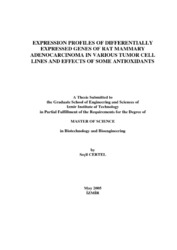Please use this identifier to cite or link to this item:
https://hdl.handle.net/11147/3204| Title: | Expression Profiles of Differentially Expressed Genes of Rat Mammary Adenocarcinoma in Various Tumor Cell Lines and Effects of Some Antioxidants | Authors: | Certel, Seçil | Advisors: | Güneş, Hatice | Publisher: | Izmir Institute of Technology | Abstract: | Cancer is the most frequent reason of death in humans after heart disease. Most of the cancers are caused by mutations in tumor suppressor genes that play distinct roles in tumor formations. If a tumor suppressor gene is mutated, it loses its function to control cell division which may lead to overgrowth of cells that leads to tumor formation. It is important to identify the genes involved in tumor formation and metastasis to develop new cancer prevention and treatment methods. In a previous study, differentially expressed genes were identified between poorly metastatic and highly metastatic cell lines of rat mammary adenocarcinoma R3230AC. Eight cDNA clones from poorly metastatic CAb.D5 cell line and six cDNA clones from highly metastatic LN4.D6 cell line were identified (Gunes and Carlsen, 2003). The aim of this study was to investigate expression profiles of these differentially expressed genes in a set of different adenocarcinoma cell lines to find if they have any relation with metastasis. Cell culture and stocks of sixteen different cell lines were prepared and RNA from these cells were isolated. After synthesizing cDNA, RT-PCR analysis was carried out using primers specific for each cDNA clone. It was found that the gene clones FF-10 and SG-1 were expressed in non-metastatic cells but not in metastatic cells suggesting that they may have a tumor suppressive potential. Antioxidants are chemicals that prevents oxidation and free radical damages on cells. Because there is some evidence that antioxidants may prevent tumor formation, effects of antioxidants such as green tea catechins, beta carotene, lycopene as well as zeolite were examined on cancer cell growth and expression profiles of the differentially expressed genes. The cells were treated with different amounts of antioxidants and the cell growth was determined by MTT assay. The effects of antioxidants in gene expression were identified by RT-PCR analysis. At 100µM and higher concentrations, epigallocatechingallate (EGCG), epigallocatechin (EGC) and beta carotene significantly inhibited cell growth. Lycopene affected the cell growth at 3µM concentration. FH-2 expression decreased by 1.8-fold with lycopene treatment. In addition, EGCG increased the SG-1 expression by 1.14-fold. No effects of antioxidants as well as zeolite on the expression of other differentially expressed genes were observed. For further studies, investigation of expression profiles of differentially expressed genes in primary and secondary tumors of human will give more definitive results for the metastatic relevance of these genes. | Description: | Thesis (Master)--İzmir Institute of Technology, Biotechnology and Bioengineering, İzmir, 2005 Includes bibliographical references (leaves: 51-63) Text in English; Abstract: Turkish and English xii, 63 leaves |
URI: | http://hdl.handle.net/11147/3204 |
| Appears in Collections: | Master Degree / Yüksek Lisans Tezleri |
Files in This Item:
| File | Description | Size | Format | |
|---|---|---|---|---|
| T000334.pdf | MasterThesis | 1.08 MB | Adobe PDF |  View/Open |
CORE Recommender
Page view(s)
346
checked on Jun 10, 2025
Download(s)
58
checked on Jun 10, 2025
Google ScholarTM
Check
Items in GCRIS Repository are protected by copyright, with all rights reserved, unless otherwise indicated.